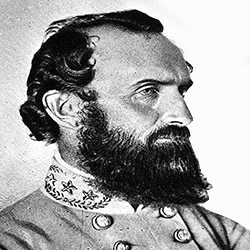Newson Publishing's young adult book Uncle T and the Uppity Spy, book is about Jackson's relationship with Jim Lewis, his slave, right-hand-man, and confidante. Stonewall Jackson defended the Virginian Southern lifestyle and state sovereignty; yet he was a pioneering educator and helper of blacks-facts which are little known when we think of the Confederate war hero. What was more, his slave Jim Lewis felt a heartfelt devotion to Jackson that could not have been born out of mistreatment or condescension.
Newson Publishing goal with this book and art show is to shed light on the complicated history of racism and the Civil War, to show people as individuals rather than icons or targets of hate, so that we may know and learn from them as human beings. PREVIEW LINK
Newson Publishing fictionalized the truth so we can get to the essence of the people involved. For example, a man of mythological proportions-General Stonewall Jackson-is lauded by a fictional character for Jackson’s very non-fictional contributions to the growth of the black church in the South. Thus we unlock the truth of the man; he was a seed-spreader of the Christian faith among slaves and free blacks because he saw them as God’s children.
Uncle T and the Uppity Spy tells the fictionalized story of two young black brothers whose life paths diverge into very different directions during the Civil War era. The young black boy Jim Lewis is chosen to be a house slave to Thomas J. Jackson (soon to become General “Stonewall” Jackson) while living on Jackson’s farm. Jim’s manners, intelligence, and character impress Jackson and endear the boy to him. When the war comes, a mature Jim serves as General Jackson’s trusted body servant. The two men grow close, and Jackson respects Jim’s loyalty and wisdom so much that he sometimes lets Jim serve as an adviser. Jim enjoys such a strong bond with the General that he has authority beyond his station in life, and sometimes the men get jealous of the general’s obvious favor toward the young man. General Jackson even allows Jim to decide on his horse, Little Sorrel, trusting that Jim understands the merit of the beast underneath the horse’s ordinary appearance.
Jim’s brother, Tyler, on the other hand, is consigned to life as a field hand on General Jackson’s plantation, and he suffers mistreatment at the hands of Jackson’s harsh overseer. The life of a field hand and house slave are contrasted in the experiences of these boys. Tyler’s attitude is the opposite of Jim’s; he is angry, bitter, and defiant, and he is only too glad to escape and join the Union cause, fighting against his oppressors.
Eventually army officials recognize that Tyler has a twin who is the body servant of Stonewall Jackson, and they arrange a “switch” between the two young men in order to gain information on troop movements and plans from within the general’s own camp. Tyler infiltrates the camp and accomplishes his mission, avoiding personal contact with Jackson, whom he is sure would be astute enough to know he is Jim’s look-alike, not Jim himself. Then the twins are switched back again, and each resumes his duties on his respective side.
At one point Tyler is given a chance to get back at his old overseer, and he takes full advantage of the opportunity. This does not sit well with the white soldiers Tyler is stationed with, however, and they take their own vengeance on Tyler with “friendly fire.”
Despite the differences in their situations and attitudes, Jim and Tyler remain close throughout the story, with Jim grieving his brother’s death and both brothers risking a great deal to visit and help one another whenever they can. Their love for one another, beyond circumstances, shines through. In some ways, the two twins represent the divided soul of black people who find themselves in the position of feeling bitterness, anger, and a desire for vengeance for all the injustices done to them by white society, like Tyler, and those who, like Jim, are able to enter into close emotional relationships with white people, as Jim did with General Jackson, to appreciate the good things some have done for their community, and to feel deep and abiding loyalty to the land of their birth as well as the commitment to do the best that they can in the circumstances of life they find themselves in, cultivating their characters, faith, and gifts.
Much historical information is contained in the book. Stylistically, this is achieved through sidebars that give background information to explain some of the underpinnings of the fictional story. The story itself, although based on real people and real events, takes poetic license in several places. One controversial point might be the death of Stonewall Jackson by friendly fire. The book implies that the general’s own spoken misgivings about slavery and “the cause” might have led some of his own men to shoot him.
General Jackson comes across as a sympathetic and admirable character. The book is introduced through a speech by Reverend Lilburn L. Downing who dedicated a stained glass window in a church to General Stonewall Jackson. The window is engraved with Jackson’s last words, “Let us cross over the window and rest under the shade of the trees.” Reverend Downing honors Thomas Jackson’s dedication to teaching black people to read and write before the Civil War. He mentions Jackson’s founding of a Sunday school for slaves and free blacks because of Jackson’s devotion to Christianity and his belief that part of the white responsibility toward blacks was to bring them to salvation, especially in light of what Jackson saw as their tremendous responsiveness to God.
The book tries to show human beings as they are–complex mixtures of right and wrong, and capable of love even across social and enemy lines.


